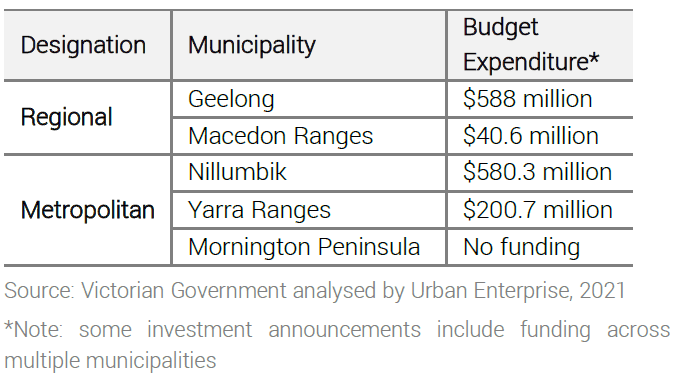Economic Disadvantage Report
Part 2: Economic Development
FULL REPORT RELEASED: March 28, 2022
Access to government funding programs provides a local economy with the financial support required to
reach its economic and social potential. At the state government level, the Mornington Peninsula’s metropolitan designation renders
the municipality ineligible for a significant pool of funding for regional economic development.
The Committee for Mornington Peninsula has explored the Australian and Victorian State Government's regional and metropolitan funding
policies' impact on Mornington Peninsula's economic development.
Our report highlights:
The Australian Government has no metropolitan-specific funding programs that lockout regional areas from funding. Although, programs
like the $4 billion Urban Congestion Fund naturally have a more metropolitan focus.
Mornington Peninsula is not receiving any significant Victorian Government funding from metropolitan-specific funding programs.
Mornington Peninsula's metropolitan status renders the municipality ineligible for a significant pool of regional economic development support from the Victorian Government.
Firstly, let's explore Mornington Peninsula's economic and demographic profile and then explore a few variations between the metropolitan and regional Victorian taxes and access to government funding.
Mornington Peninsula's Economic and Demographic Profile
The Victorian State Government has designated Mornington Peninsula as part of Metropolitan Melbourne. However, the Mornington Peninsula's demographic, socio-economic, and employment profiles align more closely to regional Victoria than metropolitan Melbourne. For example, the Peninsula experiences slow historical and projected population growth, an older age profile, lower-income levels, low unemployment, and a high job containment rate (those living and working in the area), and similar education levels to those in regional Victoria.
The largest industries in Mornington Peninsula are retail trade, health care, construction, hospitality (accommodation and food services), education and training services, and manufacturing sectors.
In addition, the Peninsula produces high-quality products and a significant portion of the total wealth generated from Victorian agriculture as the state's second most valuable agricultural region. Two of Mornington Peninsula's comparative advantages are the tourism and agriculture industries. These two sectors stand to gain the most from access to these regional programs due to their alignment with key policy objectives.
Australian Government Funding
At the Federal Government level, the designation is complex. It varies between remote, regional and urban designations based on various statistical measures. As a result, the Government has designated non-urban areas within Mornington Peninsula with a regional classification, with urban areas classified as metropolitan.
However, the programs use the urban area's classification to allocate funding, which means most of the Peninsula misses out.
The majority of Mornington Peninsula businesses and communities are locked out of the following regional programs worth more than $2.5 billion:
- $1.29 billion Building Better Regions Fund
- $1 billion COVID-19 Relief and Recovery Fund
- Regional Growth Fund
- $223 million Regional Jobs and Investment Fund
- $41 million Regionalisation and Decentralisation Agenda.
These programs support:
- Creating jobs
- Investment and growth in jobs & the economy, including long term growth and sustainable employment
- Decentralizing economic activity from metropolitan areas to stimulate growth in regional areas
- Building & strengthening communities through community development
- Recovery due to disproportionately being affected by COVID
- Infrastructure toward viable local and regional economies and addressing disadvantage.
In addition, Mornington Peninsula was ineligible for the Government's Working Holiday Maker program due to its classification under the remoteness area boundary. The program allows participants to extend their stay in Australia after completing a prescribed work period in a regional or remote location. The opportunity helps address labour shortages, particularly in tourism, hospitality, and agriculture.
In 2019, the Australian Government included the Mornington Peninsula within its designated regional areas under its regional migration definition, offering businesses and organizations access to additional visa types targeted at regional areas. This example demonstrates the ability of the Government to adjust policy eligibility to address economic and social disadvantages on the Peninsula. We believe this is important as it provides a precedent for further adjustments to occur in the future as deemed necessary from both federal and state government standpoints.
Victorian State Government Funding
The tables below show the state government budget 2021-22 funding for regional and metropolitan areas. Regional
municipalities will receive $7.86 billion
of funding, while metropolitan municipalities will receive $22.16
billion in government expenditure.
However, the
per capita figures demonstrate that regional
Victorian LGAs will receive 16% more than metropolitan
municipalities, as demonstrated below.
STATE BUDGET ANALYSIS |
STATE BUDGET: CASE STUDY ANALYSIS |

|

|
Due to Mornington Peninsula's
metropolitan designation, the municipality's local businesses, community organisations, and Council are ineligible for
regional development funding programs
administered by Regional Development Victoria (RDV). The RDV states, "Our work includes
enabling businesses to invest to consolidate and grow jobs, strengthen regional economies and enrich the social fabric of Victoria's
regional cities and towns."
The RDV's major funding programs have a combined worth of $2.39 billion of state
government investment in regional economic development
in the last twenty years.
However, the Mornington Peninsula cannot access these programs due to our designation as
metropolitan. These limitations are likely to have hindered the growth of the industries that align strongly with a number of the policy
objectives for regional funding programs, like
our region's tourism and agriculture industries.
Summary of Government Funding
The
Australian Government's funding and policy decisions must account for our similarities to other regional areas. Most visitors to the
Peninsula are unaware of the unique challenges and under-investment in essential services that the residents and businesses of the
Mornington Peninsula face. Given the present labour shortages with the local economy's reliance on tourism, hospitality, and
agriculture, these issues have become even more significant.
The Victorian budget analysis highlights that the current
lack of state government expenditure for the region is likely to be partially driven by a misalignment of
the objectives
of the metropolitan funding programs. In addition, we understand that numerous factors influence budget expenditure. However,
given a clear trend of minor to no access to metropolitan funding, a regional
designation could unlock access to a significant pool of RDV state funding programs.
Access to regional funding could significantly benefit the Peninsula's tourism and agriculture industries with no apparent losses. In addition, funding could stimulate additional public sector investment across vital economic industries, potentially catalysing private sector investment within the municipality and supporting local jobs.
What funding issues does your community, business or customers face on the Peninsula?
How
can we help with advocate for change?
Sign
up for further updates or access the full
Economic Disadvantage Report to learn
more.
This
research was conducted by Urban Enterprise as commissioned by the Committee for Mornington Peninsula in partnership with Australian
Unity.

Get the latest updates.
Subscribe To Receive Updates
THE COMMITTEE FOR MORNINGTON PENINSULA WILL:
- Continue to advocate to government at all levels to adequately support Mornington Peninsula businesses in the COVID recovery;
- Advocate to state and federal governments for further investment into the Mornington Peninsula to reduce the current disparity in public investment between the Mornington Peninsula and neighbouring municipalities;
- Commission and publicise robust research into the potential policy and funding advantages and disadvantages of a regional vs. metropolitan designation for the Mornington Peninsula, to best inform further advocacy objectives;
- Advocate to elected representatives on all sides of politics for a more suitable designation for the Mornington Peninsula than the current metropolitan model or for commensurate government investment under the current model; and
-
Maintain a record of favourable policy decisions and funding announcements that benefit comparable ‘regional’ communities and were not made
available to the Mornington Peninsula.
